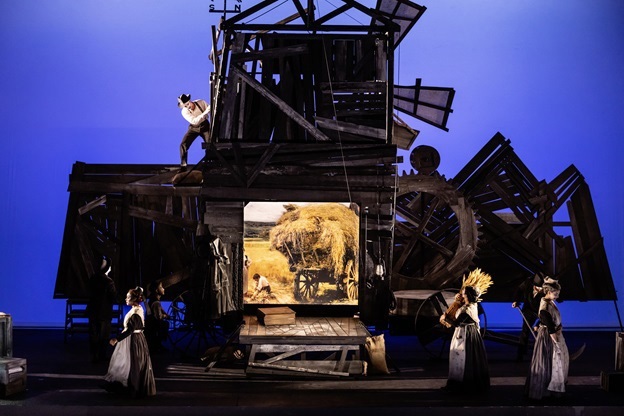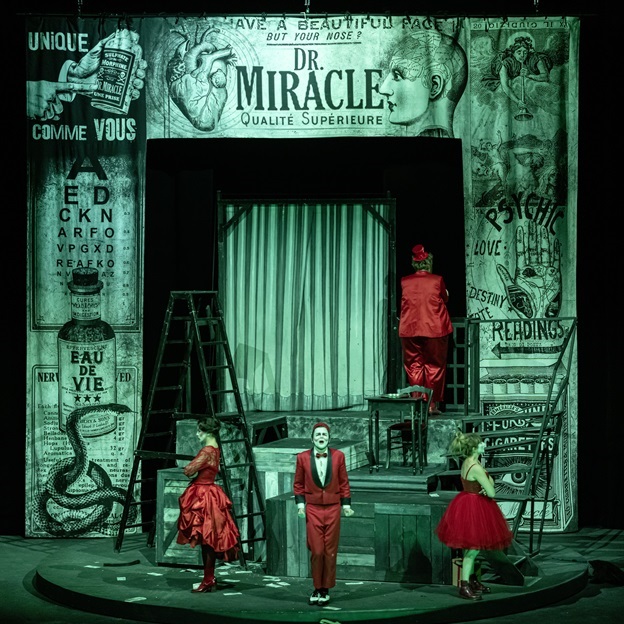The Palazetto Bru Zane and the Théâtre du Châtelet in Paris presented a double bill in tribute to the composer Georges Bizet, whose 150th death anniversary is being commemorated. Remy Franck reports.
Two works were featured: L’Arlésienne, inspired by Alphonse Daudet’s novel of the same name; and Le Docteur Miracle, an operetta with which 18-year-old Bizet tied for first place in a competition launched by Jacques Offenbach
During the performance, the audience rediscovered the complete incidental music for L’Arlésienne thanks to an adaptation featuring a narrator, an actor-dancer, two dancers, and four singers, created by musicologist Hervé Lacombe. This version refers not only to Daudet’s L’Arlésienne but also to Lettres de mon moulin (La Chèvre de M. Seguin). However, despite Eddie Chignara’s astounding performance as the Provençal storyteller – he speaks for over an hour without much of a break – we would have liked to see more narrative participation from the other dancer-actors. It’s frustrating to see a character on stage and only hear what he is saying through the storyteller’s voice.
 A huge windmill, aptly symbolizing the home of Frédéri’s family, stands in the center of the stage. This is where the story unfolds, with the peasant life and the love problems of Frédéri, who, haunted by his frivolous Arlésienne, sees no way out but suicide.
A huge windmill, aptly symbolizing the home of Frédéri’s family, stands in the center of the stage. This is where the story unfolds, with the peasant life and the love problems of Frédéri, who, haunted by his frivolous Arlésienne, sees no way out but suicide.
With its integrated puppet theatre booth showing changing canvases that evoke naturalistic landscapes and 19th-century folk scenes, the mill is an admirable inspiration for Pierre Lebon’s choreographed staging.
The excellent Orchestre de Chambre de Paris, conducted by Sora Elisabeth Lee, performs all of Bizet’s incidental music, including the vocal interventions of a quartet. The performance is highly refined, yet it lacks the lyricism that characterizes the discographic references.
Moving from tragedy to comedy, the stage for young Bizet’s operetta Le Docteur Miracle is set at the podestà, cleverly tucked away in a house emblazoned with Doctor Miracle advertisements. Pierre Lebon’s staging is bursting with inventiveness, rhythm, energy, and gags, some more outrageous than others. And the actors, all dressed in red, give it their all.
Marc Mauillon does a marvelous job as the soldier Silvio, infatuated with the podestà’s daughter and determined to win her hand in marriage. He’s up to the task, both theatrically and vocally.
Dima Bawab marks the character of Laurette with convincing charm, and is vocally superb. The podestà’s wife, Véronique, is sung by Héloïse Mas with a full, surprisingly low voice and flawless stage presence. Thomas Dolié, finally, is irreproachable in the role of Laurette’s father, a character as imposing as he is grotesque.
The conductor of the Orchestre de Chambre de Paris, Sora Elisabeth Lee, inspires her musicians well, who play with brio but also with lyricism in the more tender moments.
The audience’s hearty applause hailed two undeniable successes in this fine tribute to Georges Bizet.




















